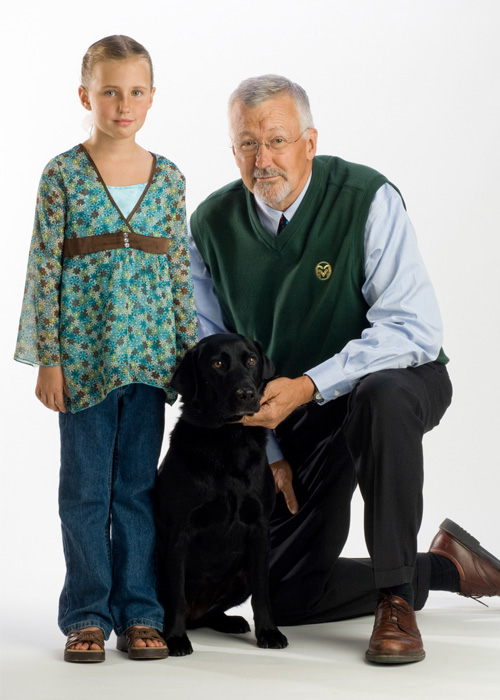
Dr. Stephen Withrow, D.V.M., Diplomate ACVS, ACVS Founding Fellow – Surgical Oncology
University Distinguished Professor
Stuart Chair in Oncology – Emeritus
Founding Director, Flint Animal Cancer Center
In 1972, I was a young, very green intern at the Animal Medical Center in New York City, one of the finest and busiest veterinary hospitals in the country.While there, I began drifting toward surgical oncology and, to gain more understanding of this field, I was encouraged to attend rounds at the Memorial Sloan Kettering Cancer Center, also in New York City. Viewing cancer from both perspectives, I gradually became aware that veterinary medicine could have a significant influence on human health as well as animal health.
Part of my training program included an outside rotation, which was visionary for its time. I chose to do a rotation at the respected Mayo Clinic in Rochester, Minnesota. It was unique for a veterinarian, a specialist in animal medicine, to do a rotation at one of the leading facilities for human cancer medicine. They didn’t quite know what to do with me. By chance on one Friday afternoon, I was asked by an orthopedic surgical oncologist to join him in seeing a patient with a bone tumor of the pelvis. Very quickly, I realized “Man, this is the place to be!” I spent three wonderful months there, which really opened my eyes. At the time, surgery was wholly underrepresented in veterinary oncology and I saw that we needed to standardize surgical oncology care for pets with cancer.
In 1978, I came to Colorado State University with the intent to build a clinical oncology service. After three years as a general surgeon, I approached the department head for permission to develop this new service that would allow us to provide the care needed for cancer patients, allow us to do translational trials, and would enable us to embrace research. In only two years we created a stand-alone clinical oncology service. We’ve been growing ever since.
Cancer is the leading cause of death in dogs and cats. I’m a veterinarian. First and foremost, my job is to alleviate pain and suffering in pet animals. Yet I realize it is all translational to human disease, and therefore it would be silly to treat animal disease in isolation from human disease. To me, it’s one medicine. It always has been. One medicine. One cancer. One cure.
A wonderful aspect of veterinary medicine is the incredibly motivated, dedicated owners. We see almost two thousand new patients each year. They travel from all over the world to come here for treatment. In almost 40 years of practice, I’ve seen amazing advancements, all thanks to hundreds of thousands of owners and their trusting pets that have no say in the matter. It’s an unbelievable privilege to oversee the healthcare delivery to man’s best friend. We don’t enter this profession for money; we enter it to help animals have a better life. This is not a forty-hour a week job, it’s a passion. It’s a professional pathway to inner peace and job satisfaction. At the Flint Animal Cancer Center, care is delivered compassionately and with team work. It’s a shared mission and a shared vision and to succeed, you need passion, integrity, and a vision of where you want to go.
I rarely get the chance to have my hair tinted green, and goof around with a bunch of kids. But for one week each year, I go to the Sky High Hope Camp and help kids with cancer just be kids. It’s been an anchor for me, in terms of the relevance of our work. You can’t put a value on alleviating suffering and pain in children any more than you can in pet animals. Children completely entrust you with their healthcare. They’re courageous. They’re tough. They face their disease with unbelievable resilience and compassion. If we can be part of that, then we’re sharing something truly special.
When the dust settles, I’m most proud of the students, the residents, the fellows, the interns, all the minds, and the lives I’ve been privileged to touch. These people will continue what we have built: the integrity, the compassion, the vision for program growth, improved healthcare delivery, and translational medicine; to further disseminate knowledge, alleviate pain, and improve the quality of life for pet animals and for people. The backbone of the Flint Animal Cancer Center is its people. We will continue to exemplify the shared benefits of treating cancer in dogs and cats – for the veterinary medical profession as well as the human medical profession. I’m very proud of the people who embrace that philosophy.